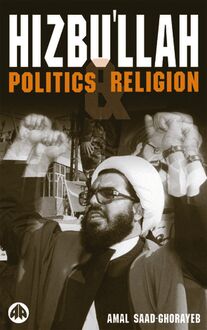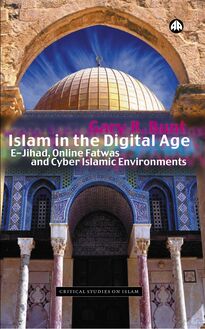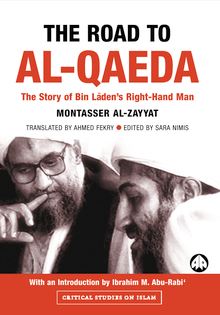-
 Univers
Univers
-
 Ebooks
Ebooks
-
 Livres audio
Livres audio
-
 Presse
Presse
-
 Podcasts
Podcasts
-
 BD
BD
-
 Documents
Documents
-
- Cours
- Révisions
- Ressources pédagogiques
- Sciences de l’éducation
- Manuels scolaires
- Langues
- Travaux de classe
- Annales de BEP
- Etudes supérieures
- Maternelle et primaire
- Fiches de lecture
- Orientation scolaire
- Méthodologie
- Corrigés de devoir
- Annales d’examens et concours
- Annales du bac
- Annales du brevet
- Rapports de stage
La lecture à portée de main
Vous pourrez modifier la taille du texte de cet ouvrage
Découvre YouScribe en t'inscrivant gratuitement
Je m'inscrisDécouvre YouScribe en t'inscrivant gratuitement
Je m'inscrisEn savoir plus
Vous pourrez modifier la taille du texte de cet ouvrage
En savoir plus

Description
The original version of this book sold widely across the Arabic world. Reproduced in translation here, with an extensive introduction from distinguished scholar Ibrahim Abu Rabi, it stands alone as an unrivalled account of the divisions within militant Islamist ideology. The author provides insight into the internal politics of Islamic Jihad, and the radicalisation of bin Laden's deputy; he examines Zawahiri's opposition to efforts by other militant Islamists to call a ceasefire with the Egyptian authorities; and he narrates the redirection of Zawahiri's activities towards the US and Israel.
As an insight into one of the key minds behind Al-Qaeda this book makes unparalleled and disturbing reading. It is an important document for anyone who seeks to understand how a minority extremist ideology came to have such an impact on world events.
Preface by Ahmed Fekry and Sara Nimis
Introduction by Ibrahim Abu-Rabi
Notes on the English language edition by Ahmed Fekry and Sara Nimis
1. The Aristocrat as Fundamentalist
2. Aftermath of Sadat's Assassination
3. Afghanistan: Land of Jihad
4. Changes in Zawahiri's Ideology
5. The Ceasefire Initiative of the Gama'a Al-Islamiyya
6. Islamists Pay for the Zawahiri's Mistakes
7. Executing a Boy and Killing a Prominent Group Leader
8. The Struggle Continues
Notes
Index
Sujets
Informations
| Publié par | Pluto Press |
| Date de parution | 20 janvier 2004 |
| Nombre de lectures | 3 |
| EAN13 | 9781783716036 |
| Langue | English |
Informations légales : prix de location à la page 0,0498€. Cette information est donnée uniquement à titre indicatif conformément à la législation en vigueur.
Extrait
The Road to Al-Qaeda
Critical Studies on Islam
Series Editors: Azza Karam (Director of the Women’s Programme at the World Conference on Religion and Peace, New York) and Ziauddin Sardar (Editor of the critical international journal of contemporary art and culture, Third Text )
Islam in the Digital Age
E-Jihad, Online Fatwas and Cyber Islamic Environments
Gary R. Bunt
Iraqi Invasion of Kuwait
Religion, Identity and Otherness in the Analysis of War and Conflict
Hamdi A. Hassan
Transnational Political Islam
Religion, Ideology and Power
Edited by Azza Karam
Islam and Modernity
Muslims in Europe and the United States
Iftikhar H. Malik
Hizbu’llah
Politics and Religion
Amal Saad-Ghorayeb
The Road to Al-Qaeda
The Story of bin Lāden’s Right-Hand Man
Montasser al-Zayyāt
Introduction by Ibrahim M. Abu-Rabi‘
Translated by Ahmed Fekry
Edited by Sara Nimis
First published by Dar Misr al-Mahrusa, Cairo, 2002; second edition published by Ula al-Nahiy for Media Production, Cairo, 2002.
This edition published 2004 by Pluto Press
345 Archway Road, London N6 5AA
and 22883 Quicksilver Drive, Sterling, VA 20166–2012, USA
www.plutobooks.com
Copyright © Montasser al-Zayyāt 2004.
This translation © Ahmed Fekry and Sara Nimis 2004
The right of Montasser al-Zayyāt to be identified as the author of this work has been asserted by him in accordance with the Copyright, Designs and Patents Act 1988.
British Library Cataloguing in Publication Data
A catalogue record for this book is available from the British Library
ISBN 0 7453 2176 3 hardback
ISBN 0 7453 2175 5 paperback
ISBN 9781783716036 ePub
ISBN 9781783716043 Mobi
Library of Congress Cataloging in Publication Data applied for
10 9 8 7 6 5 4 3 2 1
Designed and produced for Pluto Press by
Chase Publishing Services, Fortescue, Sidmouth, EX10 9QG, England
Typeset from disk by Stanford DTP Services, Northampton, England
Printed and bound in Canada by Transcontinental Printing
Contents
Series Preface
Notes on the English Language Edition
Ahmed Fekry and Sara Nimis
Preface
Ahmed Fekry and Sara Nimis
Introduction
Ibrahim M. Abu-Rabi‘
1. The Aristocrat as Fundamentalist
2. The Aftermath of Sadāt’s Assassination
3. Afghanistan: Land of Jihad
4. Changes in Zawahiri’s Ideology: The Near and Far Enemies
5. The Ceasefire Initiative of the Gamā‘a al-Islāmiyya
6. Islamists Pay for Zawahiri’s Mistakes
7. Executing a Boy and Killing a Prominent Group Leader
8. The Struggle Continues
Notes
Index
Series Preface
Critical Studies on Islam Series editors: Azza Karam and Ziauddin Sardar
Islam is a complex, ambiguous term. Conventionally it has been used to describe religion, history, culture, civilization and worldview of Muslims. But it is also impregnated with stereotypes and postmodern notions of identity and boundaries. The diversity of Muslim peoples, cultures, and interpretations, with their baggage of colonial history and postcolonial present, has transformed Islam into a powerful global force.
This unique series presents a far-reaching, critical perspective on Islam. It analyses the diversity and complexity of Islam through the eyes of people who live by it. Provocative and thoughtful works by established as well as younger scholars will examine Islamic movements, the multilayered questions of Muslim identity, the transnational trends of political Islam, the specter of ethnic conflict, the political economy of Muslim societies and the impact of Islam and Muslims on the West.
The series is built around two fundamental questions. How are Muslims living, thinking and breathing Islam? And how are they rethinking and reformulating it and shaping and reshaping the global agendas and discourses?
As Critical Studies on Islam seeks to bridge the gap between academia and decision-making environments, it will be of particular value to policy makers, politicians, journalists and activists, as well as academics.
Dr Azza Karam is a Program Director at the World Conference of Religions for Peace (WCRP) International Secretariat based in New York. She has worked as a consultant and trainer with the United Nations and various Middle Eastern and European NGOs, and has lectured and published extensively on conflict, Islam, the Middle East and the politics of development issues. Her books include Women, Islamisms and State: Contemporary Feminisms in Egypt (1998), A Woman’s Place: Religious Women as Public Actors (ed.) (2002) and Transnational Political Islam: Religion, Ideology and Power (2003).
Ziauddin Sardar is a well-known writer, broadcaster and cultural critic. He is the editor of the critical international journal of contemporary art and culture Third Text and considered a pioneering writer on Islam. He is the author of several books for Pluto Press, most recently Islam, Postmodernism and Other Futures: A Ziauddin Sardar Reader , edited by Sohail Inayatullah and Gail Boxwell.
Notes on the English Language Edition
Ahmed Fekry and Sara Nimis
Spellings for Arabic names and words in this text are chosen to facilitate easy pronunciation and reading for the English reader, without bogging him or her down with phonetic symbols. For this reason we have used the English equivalents for those consonants in the Arabic language that have close equivalents in English. Two consonants that have no close equivalents are the ‘ein , a voiced pharyngeal fricative sound represented in the text by an / ‘ / and the hamza or glottal stop which is represented by an / ’ /. Arabic also has a system of long and short vowel sounds, which is a useful guide for stressing the correct syllable in a given word. The long vowel sounds are represented as /ee/, /ū/ and /ā/.
Terms and names specific to Egypt are spelled to reflect their local pronunciation, most noticeable in the use of ‘g’ (in names such as the Gamā‘a al-Islāmiyya) where a classical pronunciation would call for a ‘j’. In less regionally specific (usually religious terms), such as jihādi , the spelling reflects the classical pronunciation. For names that are well known in the English press, or that have official English spellings in Egypt common spellings are used. For example, Al-Qaeda rather than Al-Qa‘da.
The following are Arabic terms that do not have an English translation that sufficiently captures their meaning in Arabic. Terms in italics are transliterated using the above system, whereas terms in normal print have a standard English spelling.
1. ameer : literally “prince,” refers in the text to the leader of an Islamist group
2. ansār: historically the inhabitants of Medina who supported the Prophet upon his arrival in their city after his migration from Mecca
3. awqāf : religious endowments which go to support mosques and other religious institutions
4. azhari : a graduate of the Al-Azhar University in Cairo, a Sunni institution which draws students from all over the Muslim world
5. caliph: from the Arabic khalifa, refers to political and spiritual leader of the greater community of Muslims
6. caliphate: the lands falling under the authority of a caliph
7. da‘wa : literally “call” or invitation”, refers to the efforts of pious Muslims to bring other Muslims to a life guided by Islamic orthodoxy
8. fatwa: an authoritative command or proclamation regarding a religious question, issued by a scholar of Islamic fiqh (below)
9. fitnah: literally “ordeal,” refers to civil strife, or more specifically to fighting between political factions with ideological differences, such as in the time after the death of the Prophet
10. fiqh : the science of Islamic law
11. hadeeth : The traditions of the Prophet, including his habits and the sayings attributed to him. For Sunni Muslims these traditions are an important component of Islamic shari‘a
12. hajj: the obligatory pilgrimage to Mecca, which all Muslims should perform within their lifetime; also used as a term of respect for one who has completed the pilgrimage
13. halāl: acceptable according to Islamic law or Islamic shari‘a
14. harām : forbidden according to Islamic law or Islamic shari‘a
15. hijra: literally “migration,” refers to the migration of the Prophet to Medina, or more generally, to Muslims leaving communities of nonbelievers
16. ijtihād : the use of independent judgment as a source of knowledge
17. Islamic: associated with or having the characteristics of the religion of Islam
18. Islamist: person or organization actively promoting the application of Islamic principals to the political sphere
19. jihad: literally “struggle” or “battle,” refers to the duty of all Muslims to struggle against wrongfulness and fight those who threaten Islam
20. jihādi : supportive of or promoting the importance of jihad; in the text it refers to those supportive of militant action to achieve Islamist goals
21. Koran: The holy book of Islam
22. muhājireen : literally “migrants,” originally refers to those who followed the Prophet in his migration from Mecca to Medina. The term is also used in the text to refer to the Arab Afghans, or Arabs from various countries who moved to Afghanistan to participate in jihad
23. mujāhideen : Those who are fighting jihad. In the text refers to those fighting the Soviets in Afghanistan
24. ‘omra : a minor pilgrimage
25. redda : literally “to turn away,” refers to conversion from Islam to another faith, or ceasing to believe in the tenets of Islam
26. shari‘a : literally the Islamic “path,” refers to the guidelines by which good Muslims should live
27. shura council: high level decision-making body in Islamic organizations and governments which takes decisions through consensus
28. sunna : prophetic traditions, including habits and sayings attributed to him
29. Sunni Muslims: Muslims who derive their understanding of Islamic shari‘a from the sunna or traditions of the Prophet. The majority of the world’s Muslims are Sunni
30. umma : The Islam
-
 Univers
Univers
-
 Ebooks
Ebooks
-
 Livres audio
Livres audio
-
 Presse
Presse
-
 Podcasts
Podcasts
-
 BD
BD
-
 Documents
Documents
-
Jeunesse
-
Littérature
-
Ressources professionnelles
-
Santé et bien-être
-
Savoirs
-
Education
-
Loisirs et hobbies
-
Art, musique et cinéma
-
Actualité et débat de société
-
Jeunesse
-
Littérature
-
Ressources professionnelles
-
Santé et bien-être
-
Savoirs
-
Education
-
Loisirs et hobbies
-
Art, musique et cinéma
-
Actualité et débat de société
-
Actualités
-
Lifestyle
-
Presse jeunesse
-
Presse professionnelle
-
Pratique
-
Presse sportive
-
Presse internationale
-
Culture & Médias
-
Action et Aventures
-
Science-fiction et Fantasy
-
Société
-
Jeunesse
-
Littérature
-
Ressources professionnelles
-
Santé et bien-être
-
Savoirs
-
Education
-
Loisirs et hobbies
-
Art, musique et cinéma
-
Actualité et débat de société
- Cours
- Révisions
- Ressources pédagogiques
- Sciences de l’éducation
- Manuels scolaires
- Langues
- Travaux de classe
- Annales de BEP
- Etudes supérieures
- Maternelle et primaire
- Fiches de lecture
- Orientation scolaire
- Méthodologie
- Corrigés de devoir
- Annales d’examens et concours
- Annales du bac
- Annales du brevet
- Rapports de stage









